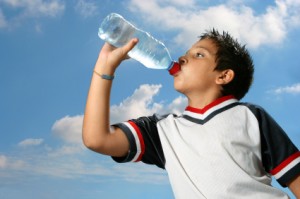
Dehydration: Signs & Symptoms
It cannot be understated that dehydration will eventually lead to shock. Shock is a life-threatening condition. The type of shock typically associated with dehydration is called hypovolemic shock, where the body’s volume of blood is compromised due to lack of fluid. The blood flows less readily throughout the body and blood pressure also drops.

What is dehydration?
Stedman’s Concise Medical Dictionary defines dehydration simply as the
deprivation of water [and/or the] process of losing body water…
The clinical definition would also include the mention of an imbalance in the body’s “fluid-salt” balance and emphasize restoring electrolyte levels along with the rehydration treatment process. But, since I am not a doctor, we’ll keep it simple & practical.
Signs of dehydration
Some common signs of dehydration include increased thirst, dry mouth & throat, chapped lips, decreased urine output, lethargic mood, constipation, and dizziness.
Severe signs of dehydration should be considered a medical emergency and professional medical treatment should be sought immediately. Mayoclinic says severe dehydration can cause the following:
- Extreme thirst
- Extreme fussiness or sleepiness in infants and children; irritability and confusion in adults
- Very dry mouth, skin and mucous membranes
- Lack of sweating
- Little or no urination — any urine that is produced will be dark yellow or amber
- Sunken eyes
- Shriveled and dry skin that lacks elasticity and doesn’t “bounce back” when pinched into a fold
- In infants, sunken fontanels — the soft spots on the top of a baby’s head
- Low blood pressure
- Rapid heartbeat
- Rapid breathing
- No tears when crying
- Fever
- In the most serious cases, delirium or unconsciousness
Sept. 28, 2011
http://directive21.com/blog/?p=781
